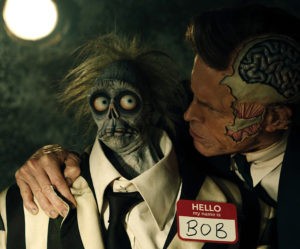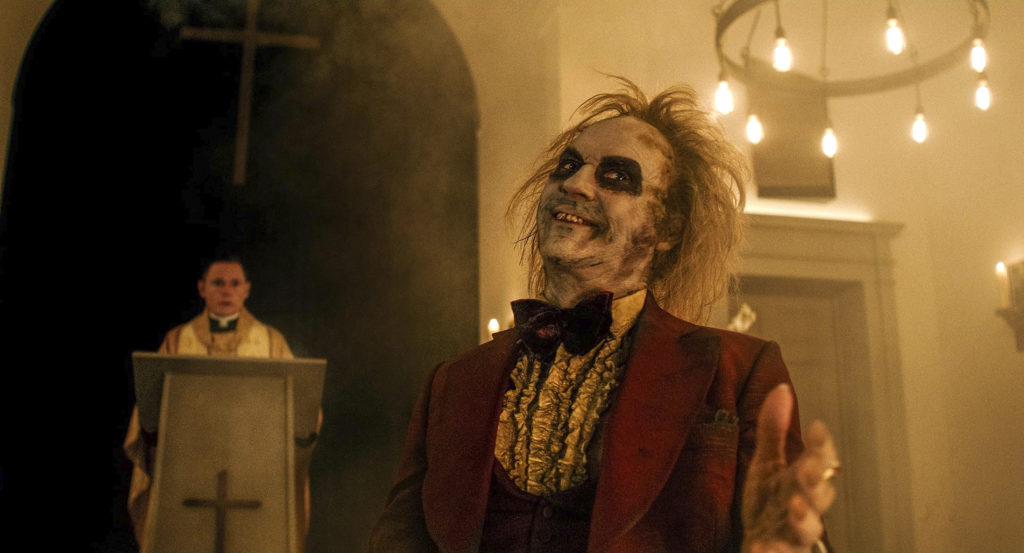I pity the Grim Reaper. We blame him for that whole death thing, but is that really his fault? We brought that upon ourselves with a poor fruit-picking choice. The Grim Reaper is merely the pallbearer of bad news, there’s no point in shooting the messenger when he’s already dead.
After all, his primary job isn’t to kill us or shake us off our mortal coil, but to embody our own fears about death. Back in ye olden times, this was represented by a scythe and a scary robe. In the recently released “Beetlejuice Beetlejuice,” this is represented by bureaucracy.
“Beetlejuice Beetlejuice” is the sequel to the 1988 classic with half the name. In a great credit to Western medicine, director Tim Burton and nearly all the cast are back after 36 years to follow up on the adventures of the Deetz family and their encounters with the hereafter.
When we last left Lydia Deetz (Winona Ryder), she was a sardonic Goth teen who spooked the ghosts only she could see. Some four decades later, she’s still a goth but in a diminished state, using her supernatural skills for a hacky haunted house reality show. It is the kind of programming that the History and Discovery channels now air ever since they gave up on our nation’s children.
Lydia must return home to Connecticut for her father’s funeral, heading to the wake with her dull New Age boyfriend Rory (Justin Theroux), stepmother Delia (Catherine O’Hara), and angsty daughter Astrid (your Gen Z niece’s favorite actress Jenna Ortega). Connecticut is already a sad enough destination, some would say a step above death itself, but Lydia has more than one reason to dread the return visit: Her childhood home is where the slovenly, eponymous poltergeist Betelgeuse (Michael Keaton) attempted to marry her.
Betelgeuse still pines away in the afterlife for his runaway bride, but has more pressing concerns at the moment. His first wife, Delores (Monica Bellucci), seeks revenge on him for having the audacity to kill her as she killed him. Both are pursued by a ghost detective Wolf Jackson (Willem Dafoe), under arrest for ghost crimes, I guess. Meanwhile Astrid strikes up a romance with a local boy, who like most teen boys has an ulterior motive (though not the kind you’d suspect). Lydia has her own romantic woes with Rory pressuring her to marry before the funeral, and through all of this Betlegeuse still haunts her dreams.

As you might have guessed by now, the pleasures of this movie are not in the plot structure. Instead, they can be found in Burton’s still-amusing conception of the afterlife as bureaucratic drudge, with souls shuffled along DMV style until it’s determined whether they are a sheep or a goat. It is the ultimate hurry-up-and-wait, with life a blink only to spend the next thousand years holding out till your number gets called. It is an ecumenical purgatory, its very existence validating Catholics but its focus on standing orderly in line favoring our Protestant brethren.
The other joy is in seeing old friends again, and I include Betelgeuse in this number. Keaton steps back into his most famous role without missing a beat, though the pound of makeup caked on his face certainly helps ease the transition. Just like the first film, it is surprising how little we actually see of him in a film bearing his name (and this time twice over). Betelgeuse is used sparingly but wisely, usually as a defibrillator to the temples every time the movie buckles under the burden of its seven storylines.
In the first film Betelgeuse was the ostensible villain, but the sequel concedes that audiences love him too much and have reclassified him as an amiable rogue. I maintain this has always been the case, that the subtextual takeaway of the “Beetlejuice” series is how there is more integrity to his open skullduggery than the subterfuges of the living.
Despite his one-sided infatuation, he’s the only character in the movie who never lies to Lydia. When they form a tentative alliance in the second half of the film, he goes above and beyond the call of duty, and with a certain zest the moment doesn’t demand but appreciates. We are drawn to Betelgeuse because despite being dead for more than 600 years, he still seems more alive than the other men in her life.
The other imparted message is how despite the bigoted slander that ghosts haunt humans, it is mostly the other way around. It is we who barge into their dwellings, we who monopolize their spaces, then have the audacity to call in the exorcist when a specter makes a stair creak. The duty of the living is to pray for the dead, but too often we pester them with demands when they are preoccupied with cleansing fire. Chesterton called tradition the democracy of the dead, but our treatment of the deceased suggests that they are governed by the mortal with all the tact of a junta.
The request on all the gravestones is a reasonable one, to simply be left to rest in peace. “Beetlejuice Beetlejuice” is the reminder, perhaps the warning, of what happens when we proceed to knock anyway.

